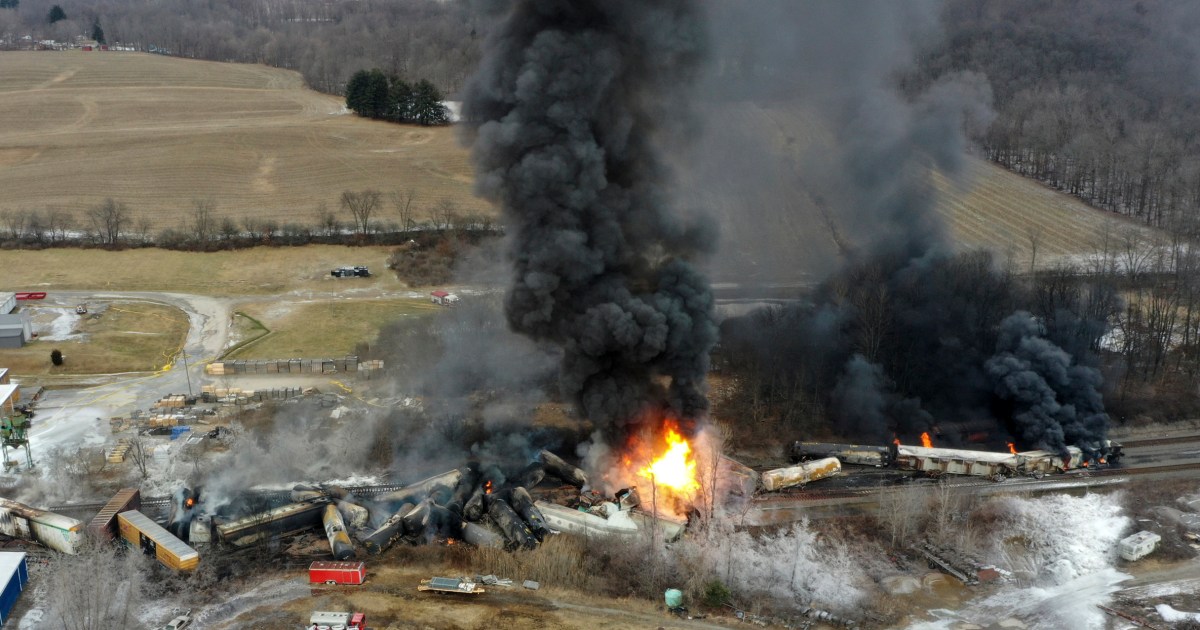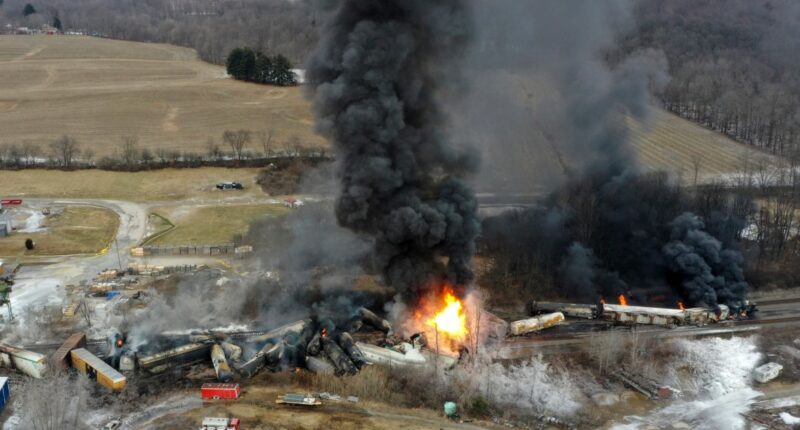
The decision to vent and burn five train cars’ carcinogenic chemicals in East Palestine, Ohio, in February came under renewed scrutiny Thursday as federal investigators questioned officials in the community still reeling from the aftermath of a toxic train derailment.
The National Transportation Safety Board, or NTSB, on Thursday held the first of two days of investigative hearings in East Palestine, a village of around 4,700 near the Ohio-Pennsylvania border where the Feb. 3 derailment occurred.
It was revealed Thursday that Norfolk Southern’s train twice needed repairs by mechanical personnel the day before the derailment in East Palestine, according to investigators, who say fire from the train was seen on camera as far as roughly 26 miles from the derailment site.
An overheated wheel bearing appears to have been the cause of the derailment, which involved 38 rail cars, the NTSB has said. Eleven cars carrying hazardous materials ignited and fueled fires, it said.
Federal investigators also published a massive trove of files Thursday as they began questioning railroad, first responder and other officials in person.
On Feb. 6, three days after the train derailed and caught fire, officials in Ohio who said they feared an explosion released vinyl chloride, a toxic, flammable gas, and there was a burn-off.
Five cars that derailed contained stabilized vinyl chloride monomer, or VCM, Paul Thomas, a vice president for the manufacturer Oxy Vinyls said.
The tanks did not breach and pressure release devices worked, he said. Vinyl chloride when exposed to heat can undergo a “rapid polymerization reaction” that can cause an explosion, according to the NTSB.
Thomas said the company spoke to Norfolk Southern and its emergency response contractors after the derailment.
“We made it clear, based on our expertise of the chemical properties of our product, that stabilized VCM would be unlikely to spontaneously polymerize,” Thomas said.
He said Oxy Vinyls did not have real-time information from the site and “we did not participate in or recommend the decision on the vent and burn operation.”
Robert Wood, director of hazardous materials at Norfolk Southern, said Thursday they did observe what they believed to be “multiple signs of polymerization” in the tanks with vinyl chloride.
“Our concern grew quickly, because an uncontrolled explosion of a tank car would be catastrophic,” Wood said.
Keith Drabick, chief of East Palestine’s volunteer fire department made up of 38 members, made the final decision to vent and burn chemicals.
He said Thursday that Norfolk Southern never told him that Oxy Vinyls had advised that they didn’t believe polymerization was occurring.
Drabick said he “kind of got blindsided” when it came time to make the call on a vent and burn, according to a transcript released Thursday.
“I was met by the CEO and several other members and one of the members said I had 13 minutes to make a decision of whether or not we were going to vent or burn because they were running out of daylight. I was very overwhelmed by that approach to explaining that to me,” he said according to a transcript.
Drabick said Thursday there was a consensus. The railroad and its contractors were especially concerned with one tank of vinyl chloride for a vent and burn, due to temperature, he said.
A meeting was held with unified command that included Ohio Gov. Mike DeWine, he said. “We had to make that decision very quickly,” and there were no objections or alternative means to control it, he said.
“The decision was made to go ahead and allow that process to happen, to prevent that catastrophic failure of the railroad car,” Drabick said.
Norfolk Southern CEO Alan Shaw has been called before both Ohio lawmakers and members of Congress, and he apologized for the derailment. He pledged that the railroad would thoroughly and safely clean the site.
The NTSB in March said it was launching an investigation into Norfolk Southern, including looking into the railroad’s safety practices and culture.
Ahead of Thursday’s hearing, Norfolk Southern issued a statement detailing its efforts on safety initiatives and progress on remediation of the derailment site.
Drabick told the NTSB at Thursday’s hearing that the train derailment “has changed East Palestine forever.” He said it was a miracle that no one was killed and that more property wasn’t damaged.
He said it remains to be seen if there are health effects.
“I’m concerned about not only my responders, but everybody around for longterm health concerns” he said. “It’s got to weigh in the back of your head, for everybody.”
Phil Helsel and Nadine Comerford contributed.
Source: | This article originally belongs to Nbcnews.com









